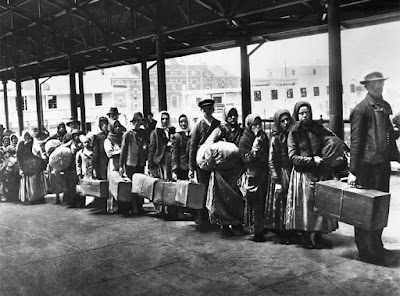Bret Stephens Counterfactually Channels Hugo Bettauer: America Without Jews
When it rains, it pours….
Right on the heels of Paul
Krugman’s counterfactually-minded New York
Times op-ed, which asks readers to imagine a Know-Nothing-run America
without immigrants and respect for education (see previous post below), Bret Stephens’ essay
in today’s Times imagines a Jewish
spin-off with the same counterfactual premise.
He writes:
“Here’s a thought experiment: Would the United
States have been better off if it had banned Jewish immigration sometime in the
late 19th century….The
question is worth asking, because so many of the same arguments made against
African, Latin-American and Muslim immigrants today might have easily been
applied to Jews just over a century ago.”
Jews, he points out, were
also attacked as disproportionately responsible for committing crimes and of being undereducated,
racially undesirable, and unlikely to assimilate.
He goes on to speculate:
“Yet imagine if the United
States had followed the advice of the immigration restrictionists in the late
19th century and banned Jewish immigrants, at least from Central Europe and
Russia, on what they perceived to be some genetic inferiority. What, in terms
of enterprise, genius, imagination, and philanthropy would have been lost to
America as a country? And what, in terms of human tragedy, would have
ultimately weighed on our conscience?”
Stephens does not answer his own question, but interested
readers could easily find the consequences outlined in Hugo Bettauer’s famous novel, The City Without Jews (1922), which
portrays the expulsion of Vienna’s Jews paralyzing the city by removing some of its most productive and creative citizens.
Stephens’ rationale for writing his essay is clear – to provide
lessons in the current American immigration debated.
He writes:
“Today, American Jews are widely considered the model minority,
so thoroughly assimilated that organizational Jewish energies are now largely
devoted to protecting our religious and cultural distinctiveness. Someone might
ask Jeff Sessions and other eternal bigots what makes an El Salvadoran, Iranian
or Haitian any different.”
Stephens’ essay, like Krugman’s, once again highlights the analytical
and rhetorical value of “what ifs.” His
strategy of revealing what we’d lose without immigration, as opposed to what we
gain by having it, once again illustrates the value of negative counterfactuals
in revealing the value of something by asking us to imagine its absence.



Comments